| This article is an orphan, as no other articles link to it. Please introduce links to this page from related articles; try the Find link tool for suggestions. (January 2019) |
Ettore or Eduardo Ettore Forti was an Italian painter, who was prolific in depicting realistic Neo-Pompeian scenes of Ancient Roman life and events. These subjects were popular in the late-Victorian period, as exemplified by the popularity of Lawrence Alma-Tadema.
There is little definitive information available about Forti's biography. His paintings are signed with his name and Rome. Different sources can not cite a place of birth or birth date, and do not agree about a birth date. Nothing is known of his training. Many sources claim he was active a few decades before and after 1900. He exhibited in Berlin between 1893 and 1897. He exhibited at the Mostra della Romana Società degli Amatori e Cultori in 1905.
One favorite topic is a salesman displaying artwork, jewelry, or rugs to well-dressed female patrician women, often in elegant settings.
-
 Evening at the temple
Evening at the temple
-
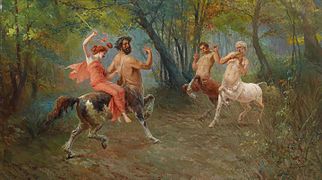 Feast of Centaurs
Feast of Centaurs
-
 Rug Merchant in Ancient Rome
Rug Merchant in Ancient Rome
-
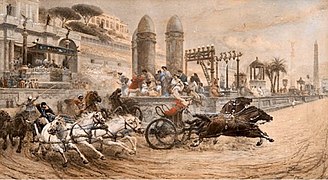 Chariots racing in the Circus Maximus
Chariots racing in the Circus Maximus
-
 Pompeii Street Scene
Pompeii Street Scene
-
 The Bath (?)
The Bath (?)
-
 The Carpet Seller (1)
The Carpet Seller (1)
-
 The Carpet Seller (2)
The Carpet Seller (2)
-
 The Carpet seller (3)
The Carpet seller (3)
-
 The Carpet seller (4)
The Carpet seller (4)
-
 The Carpet Seller (5)
The Carpet Seller (5)
-
 Chariot Racing
Chariot Racing
-
 Racing Chariots Entering The Circus Maximus
Racing Chariots Entering The Circus Maximus
-
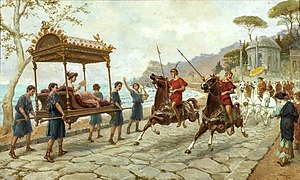 Road to Pompeii
Road to Pompeii
-
 Steps(?)
Steps(?)
-
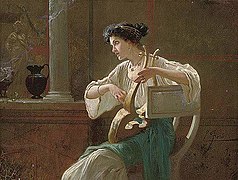 The Harpist(?)
The Harpist(?)
-
 In A Jewelry Store
In A Jewelry Store
-
 Detail from a Pompeii Love Song
Detail from a Pompeii Love Song
-
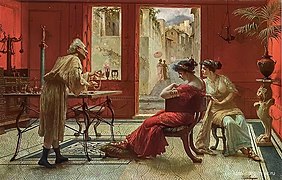 In A Jewelry Store
In A Jewelry Store
-
 Pompeii Street
Pompeii Street
-
 Art Seller
Art Seller
-
 Fruit Vendor
Fruit Vendor
-
 Hadrian returns from Tivoli
Hadrian returns from Tivoli
-
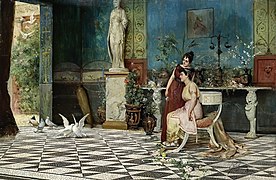 In the Roman Palace
In the Roman Palace
-
 Inside A Roman Villa
Inside A Roman Villa
-
 Pompeii Love Song
Pompeii Love Song
-
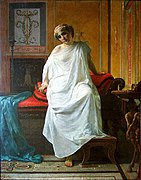 The Bedchamber(?)
The Bedchamber(?)
-
 The Embarkment of a Roman Queen
The Embarkment of a Roman Queen
-
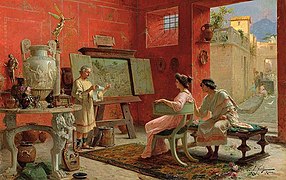 The Art Seller
The Art Seller
-
 Burdens(?)
Burdens(?)
-
 Festival
Festival
-
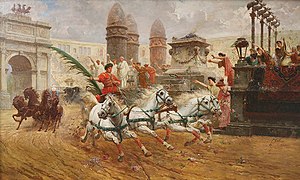 Greeting The Victor
Greeting The Victor
-
 Rug Merchants
Rug Merchants
-
 The Musicians
The Musicians
-
 Victory
Victory
-
 Arrival of Caesar
Arrival of Caesar
-
 At the Antiquarian's
At the Antiquarian's
-
 The Vendor of Antiquities
The Vendor of Antiquities
-
 Quadriga on the Road to Pompeii(?)
Quadriga on the Road to Pompeii(?)
-
 The Carpet Seller (6)
The Carpet Seller (6)
-
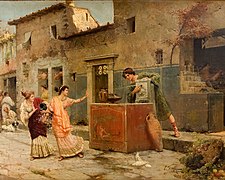 Roman Street Scene
Roman Street Scene
-
 Interior of a Roman Building with Figures
Interior of a Roman Building with Figures
References
- Getty Museum, Interior of Roman Building with Figures.
- Istituto Matteucci, short biography.